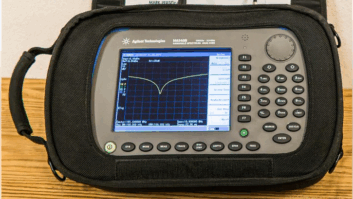Need a resistor or fuse to complete a repair project today? Where are engineers turning for same-day procurement of electronic parts now that Radio Shack has reorganized and closed many stores?
We interviewed several engineers in various parts of the country to see how they are managing and dug up details about retailers that help to fill the gap.
Radio Shack, a place many engineers recall as a source of electronic parts since they were pre-teen tinkerers, entered Chapter 11 bankruptcy in February. As reported by Reuters and others, the courts approved a buyout of the 94-year-old company by the hedge fund Standard General for $160 million. Combined with a shared store-space agreement with Sprint Wireless, it is expected that the deal will save only about 1,700 of the more than 4,200 stores.

Started in 1921, when it targeted the new hobby of radio listening, as well as amateur and professional radio operators, Radio Shack is the last remaining member of the electronic hobby chain stores.
Many professionals in fields related to electronics and computers have relied on Radio Shack for basic parts, as well handy sub-assemblies that could be used to solve problems.
One long-time San Diego engineer recalls building a “contest machine” on short notice from promotions. Everything was bought from the Shack, including a rotating light beacon, sirens, power supply and a keypad/controller (originally made for use as part of a burglar alarm).
THE WELL-STOCKED WORKSHOP
We asked chief engineers and other industry insiders: Other than tools, just what should one have on hand for emergencies? And has this changed due to the closing of Radio Shack stores?
When we asked how changes have affected them, most responded “not much,” because the company had failed to fill this need for a decade or more as it morphed from hobby store to cellphone emporium. Thus most had already added stock for fuses, resistors, capacitors and similar components.
Several mentioned that far too often the local store has insufficient stock on hand. Despite Radio Shack’s presence in nearly every town, the need to travel to more than one just to get a half dozen of some item could be a burden. One person also observed that the time to go to a big box store, find merchandise, pay and get out made even that option unattractive compared to overnight delivery from an in-state store.
The consensus is that it is far better to rely on a well-planned backup strategy, combined with overnight shipping, than to rely on Radio Shack.
HOW ARE THEY COPING?
Ample backup systems and a well-stocked shop are luxuries many smaller stations cannot afford. Even overnight shipping costs may prove to be a burden. And since these stations are often in rural areas, the odds of a Radio Shack nearby have now dropped considerably.
With this in mind, we asked how engineers are coping. As with most challenges, the Boy Scout’s motto rings true: Be prepared.
Here are some options shared with us, and we suggest you look into these resources sooner rather than later.
STORES THAT HELP FILL THE GAP
First, your local hardware store(s) may help fill the gap, particularly for switches, fuses, audio and computer cables, wire and cable of some types, tools, etc.
You may want to determine in advance which hardware store would be most likely to have what you may need. Even in rural areas, there is likely to be a hardware store not too far away.
As these stores are independently owned, taking the time to visit them in advance is a good investment. Discussing the types of needs you have with the owner, may even result in tweaking of stock to your benefit. You may also learn how often the store gets deliveries, what they can order and order cutoff times.
If your station still does trade outs, this could be a win-win.
Fry’s — www.frys.com
West Coast engineers mentioned Fry’s Electronics. With 34 stores, many in California, it has stores up the coast to Oregon and Washington. It also has a significant presence in Texas, stores in Arizona, Nevada and even as far east as Illinois, Indiana and Georgia.
Not all were fans, but all agreed that Fry’s fills the same-day parts need well. As a super-store, Fry’s has a wide range of consumer electronics (over 50,000 items) such as audio equipment, as well as electronic parts, and it sells computer gear and office supplies as well.
Micro Center — www.microcenter.com
With only 25 stores, most east of the Mississippi, Micro Center is regional. Several East Coast panelists mentioned them, especially for IT items. Billing itself as a “Computer Department Store,” it is more focused on computers and IT than Fry’s.
However, it recently added a hobby section. In addition to science kits, rockets and micro controllers, this department has a selection of resistors, capacitors, fuses and other items of interest to station engineers. More recently, it has added a number of active components such as transistors and some integrated circuits.
Graybar — www.graybar.com
Founded in 1869, Graybar comes as a surprise to most outside the telecom or electrical industries.
As its website claims, “If a customer needs an end-to-end solution for a lighting project, switchgear upgrade, a local or wide area network, or even a half-mile of electrical conduit, Graybar has it, and we deliver it when and where it is needed.”
Graybar has one or more locations in most metropolitan areas (over 260 in all), covering all 50 states and Puerto Rico. If you need an equipment rack or bulk cable, the same day, Graybar is a good bet to come through.
A FEW MORE
Some cities, especially in the Silicon Valley vicinity, still have independent walk-in electronics stores. If nearby, these would be your first choice for parts.
W. W. Grainger has stores in major cities as well as an online store. They mostly focus on hardware items, but they now have audio connectors, cables, adapters and even some audio and video systems devices.
McMaster Carr has a huge range of hardware items and offers delivery from regional warehouses.
Jameco, Digikey, MCM, Newark and Mouser can provide components overnight.
Amazon has been testing same-day delivery, so that may be the solution of the future.
And there will still be Radio Shack stores out there, but only time will tell if they choose to return to their roots and offer and maintain stock of the types of items needed by radio engineers on short notice.
There has been grumbling for years about changes at Radio Shack. Its disinterest in the hobby and electronic component business may have softened the blow of the current reorganization. And the modern options of Internet stores, overnight delivery and the access to many vendor websites most certainly ease the pain.
And at least for some items, the vendors listed here may pull you out of a jam should you need that part now. As always, be vigilant!
Rolf Taylor is a former chief engineer and a support and product specialist for several broadcast equipment manufacturers. He is principal of Rocket Engineering and Consulting. Full disclosure: Taylor is employed by Micro Center and has previously worked for an Ace Hardware store.







